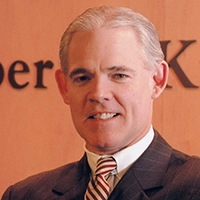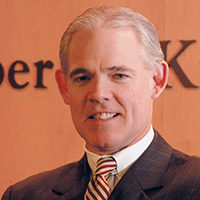Charles “Chuck” Cooper
Founder and Chairman
Cooper & Kirk PLLC

Charles “Chuck” Cooper
Founder and Chairman
Cooper & Kirk PLLC
Charles J. Cooper is a founding member and chairman of Cooper & Kirk, PLLC. Named by The National Law Journal as one of the 10 best civil litigators in Washington, he has over 25 years of legal experience in government and private practice, with several appearances before the United States Supreme Court and scores of other successful cases on both the trial and appellate levels.
Shortly after serving as law clerk to Judge Paul Roney of the Fifth (now Eleventh) Circuit Court of Appeals, and to Justice (later Chief Justice) William H. Rehnquist of the Supreme Court of the United States, Mr. Cooper joined the Civil Rights Division of the U.S. Department of Justice in 1981. In 1985, President Reagan appointed Mr. Cooper to the position of Assistant Attorney General for the Office of Legal Counsel. Mr. Cooper reentered private practice in 1988, as a partner in the Washington, D.C. office of McGuire Woods. From 1990 until the founding of Cooper & Kirk in 1996, he was a partner at Shaw, Pittman, Potts & Trowbridge where he headed the firm’s Constitutional and Government Litigation Group.
Mr. Cooper’s practice is national in scope and is concentrated in the areas of constitutional, commercial, and civil rights litigation. He is currently representing private clients in a variety of commercial cases, including antitrust, intellectual property, and contract disputes. Mr. Cooper also represents a number of state and local government bodies, as well as private clients, in a wide range of constitutional and federal statutory cases.
In 1998, Mr. Cooper was appointed by Chief Justice William H. Rehnquist to serve as a member of the Standing Committee on Rules of Practice and Procedure of the Judicial Conference of the United States. Mr. Cooper is a member of the American Law Institute and the American Academy of Appellate Lawyers, and he has spoken and published extensively on a wide variety of constitutional and legal policy topics.
Mr. Cooper earned his B.S., with honors, from the University of Alabama and his J.D. from Alabama Law graduating first in his class and serving as Law Review editor-in-chief.

A person listed as a contributor has spoken or otherwise participated in Regulatory Transparency Project events, publications, or multimedia presentations. A person's appearance on the website does not imply an endorsement or relationship between the person and the Regulatory Transparency Project. The Regulatory Transparency Project takes no position on particular legal or public policy issues. All expressions of opinion by a contributor are those of the contributor.
Contributions
2018 JLEP Symposium: Financial Innovation and Innovative Financial Regulators
Government regulation is intended to improve the efficiency of markets and protect people from harms they cannot identify or prevent on their own. But, for decades, advocates have debated whether the regulatory process and rules developed through it are too strict or too lax; whether they properly account for all the things society values; and even whether they make society better or worse off on balance. The Journal of Law, Economics & Policy’s Symposium on Regulatory Reform, Transparency, and the Economy explored these and related questions as leading scholars and practitioners examined a number of recent regulatory proposals impacting a broad swath of the American economy – from banking and finance to energy and the environment, and from employment law to the internet economy. Speakers considered and debated how well these proposals would perform their intended functions and how they might be improved.
The symposium featured discussions of research papers prepared by experts working on the Federalist Society’s Regulatory Transparency Project. The proceedings of the Conference were published in a special symposium issue of George Mason’s Journal of Law, Economics & Policy.
Watch this video
